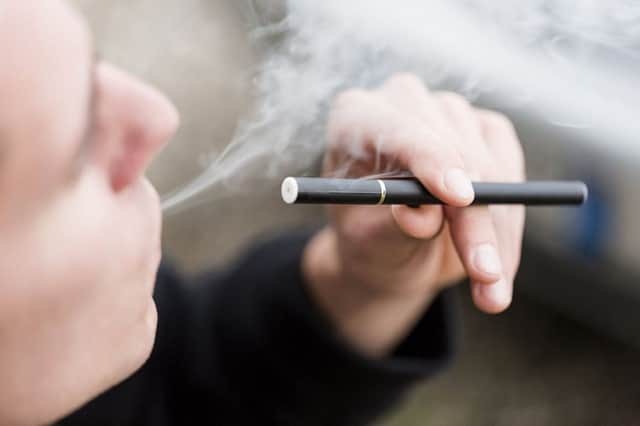'˜Lack of awareness' prevents doctors from recommending e-cigs


More than one in four health professionals would not recommend e-cigarettes to cancer patients who already smoke, according to new research.
Researchers said that health workers need more smoking cessation training and there needs to be better local resource to help doctors guide their patients.
Advertisement
Hide AdAdvertisement
Hide AdThe comments come after a poll of 500 UK medics – including GPs, cancer doctors and nurses – found that 29 per cent said they would not recommend e-cigarettes to cancer patients who smoke.
This is despite Public Health England previously backing the devices, saying they are a useful aid for quitting.
The new survey, presented to the 2018 NCRI Cancer Conference in Glasgow, also found that more than half of those surveyed said they did not know enough about e-cigarettes to make recommendations to patients.
A quarter did not know whether e-cigarettes were less harmful than smoking.
Meanwhile 46 per cent said their hospital or clinic did not have guidance on what advice they should give to patients about the use of e-cigarettes, with a further 45 per cent saying they did not know if guidance existed.
Dr Jo Brett, senior research fellow at Oxford Brookes University, said: “Smoking is a well-established risk factor for many common cancers. It is the single biggest avoidable cause of cancer in the world.
“Problems caused by smoking continue after a cancer diagnosis. It increases the risk of treatment complications, cancer recurrence and the development of a second primary tumour, leading to an increased risk of death. So it’s vital that these patients are encouraged to stop smoking.
“E-cigarettes are now the most popular intervention for smoking cessation in the UK.”
Advertisement
Hide AdAdvertisement
Hide AdShe added: “However, little is known about health professionals’ knowledge and attitude towards e-cigarettes and whether they are endorsing use of e-cigarettes with cancer patients. These results suggest that there’s a lack of clear policy on e-cigarettes at the local level. They also suggest a lack of awareness of existing evidence and national policy on e-cigarettes among doctors and nurses.”
The NCRI Cancer Conference is the UK’s largest forum showcasing the latest advances in cancer research.
Prof Linda Bauld, Cancer Research UK’s prevention expert, said: “Studies like this are valuable because they shed light on the real-world application of evidence and show how it is being translated in to practice. Although we have evidence to show e-cigarettes are a substantially less harmful alternative to smoking tobacco for cancer patients, this survey highlights that not all health professionals know this. They are unsure how to talk to cancer patients who smoke about e-cigarettes.
“It also suggests that doctors and nurses need better information and clearer policies to guide their discussions with patients.”